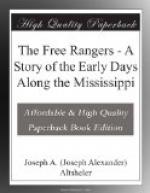Suddenly they saw in the middle of the bayou, about a hundred yards before them, a small, black shape, so low that it seemed to blend with the water. It was an Indian canoe, the first outpost of the savage force, and its occupant, promptly firing a rifle, raised a long, warning shout. In an instant the woods on either side began to crackle with rifle-fire. Skirmishers had met skirmishers, and the battle of the bayou had begun.
“Press on! Press on! We must cut through somehow!” cried Adam Colfax, and the American fleet moved steadily and unfalteringly on toward its goal. They came now to the narrowest part of the bayou, and stretched across it they saw a dark line of canoes, all crowded with Indians and the desperadoes of Alvarez. Behind them heaved up the dark bulk of the captured schooner.
The battle blazed in an instant into volume and fury. Two lines of fire facing each other were formed across the bayou, one bent upon pushing forward, the other bent upon holding it back. These lines, moreover, stretched far into the woods on either bank, where sharpshooters lay, and both sides shouted at intervals as the blood in their veins grew hot.
The dark hulk of the schooner suddenly burst into spots of flame, and the woods and waters echoed with heavy reports. The captured nine pounders were now helping to block the passage, but the brass twelve pounders on the supply fleet replied. Steadily the fire of both sides grew in volume and the lines came closer and closer together.
The moonlight faded again and little clouds of smoke began to rise. These clouds gradually grew bigger, then united into one heavy opaque mass that hung over the combatants. Strips of vapor were detached from it and floated off into the forest. A sharp, pungent odor, the smell of burnt gunpowder, filled the nostrils of the men and added to the fire that burned in their veins.
This, the largest battle yet fought in the southern woods, had a somber and unreal aspect to Paul. All around them now was the encircling darkness. Only the area in which the battle was fought showed any light, but here the flashes of the firing were continuous and intense. The crash of the rifles never ceased. Now and then it rose to greater volume and then fell again, but rising or falling it always went on, while over it boomed the big guns answering one another in defiant notes of thunder.
The schooner was the most formidable obstacle to the passage. It lay full length across the narrow bayou and, even if the boats of the supply fleet should reach it, there was little room to pass on either side. From its decks the nine pounders were fired fast and often with precision, and the majority of the Spaniard’s desperate band found shelter there also, firing with rifles, muskets, and pistols. Others sent bullets, also, from the comparative security of port holes. The possession of the schooner gave them a great advantage and they did not neglect it. Now and then they sent up fierce yells, the war-cries of the West Indian pirates, and their Indian allies answered them with their own long-drawn, high pitched whoop, so full of ferocity and menace. Both looked forward to nothing less than complete triumph.




